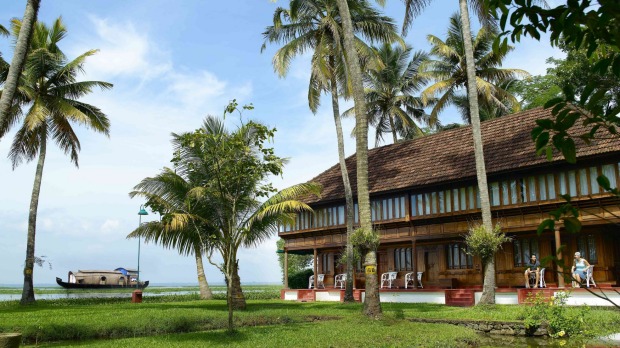
Jose Dominic and I are discussing new business ideas over drinks, trying to outdo each other with radical, ambitious, even preposterous proposals.
Eyes dancing, he hops from leg to leg as his hyperactive brain clicks into overdrive, the grain of an idea suddenly seeming quite feasible, a challenge he's keen to run with.
It's this passion, open-mindedness and fearlessness that has made Dominic one of India's most successful hoteliers, a highly-awarded visionary recognised by his peers as a pioneer in responsible tourism practices in the southern state of Kerala.
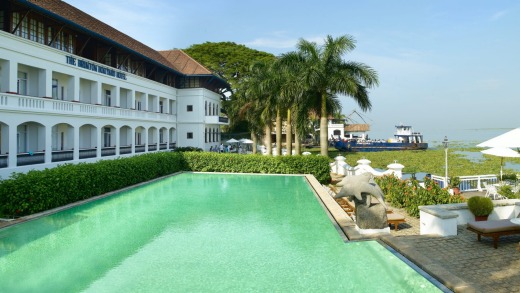
Starting as a small family-run enterprise in 1954, Dominic's company CGH Earth has grown from a single hotel to a portfolio of 14 properties, ranging from boutique city hotels to wellness retreats, private luxury bungalows, beach resorts and a backwaters houseboat cruise – all designed to create memorable experiences for travellers looking beyond a standard hotel stay.
Over dinner on the wharf at Brunton Boatyard, CGH Earth's flagship property in Cochin, Dominic explains how he reluctantly entered the family business and accidentally became a major player in tourism.
Jose Dominic kept the thatched beachfront property as it was, simple and rustic, with barefoot ethics.
"During the 1980s, I was invited – along with many other big names in the hotel business – to tender for a 25-year lease on a resort at Bangaram Island," he says.
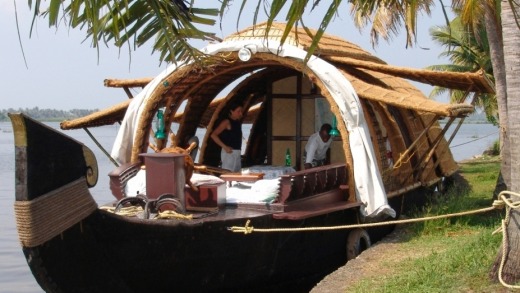
"This is part of a remote archipelago 460 kilometres off the coast of India. I had heard it was beautiful, and thought it was a great opportunity to see the islands, since they had offered to fly us out there. I never thought I'd actually win the tender – I just wanted a free holiday!"
With limited budget, Dominic's pitch was to keep the thatched beachfront property as it was, simple and rustic with limited communications and barefoot ethics – somewhat of a radical idea during a period of ostentatious hotel development. To his surprise, that's exactly what the local community wanted – minimal impact on their pristine environment.
Dominic won the tender, introducing a sustainable infrastructure and ecologically sensitive waste management system to capitalise on nature's bounty, but allowing the stunning location and interaction with the local community to be the main attraction.
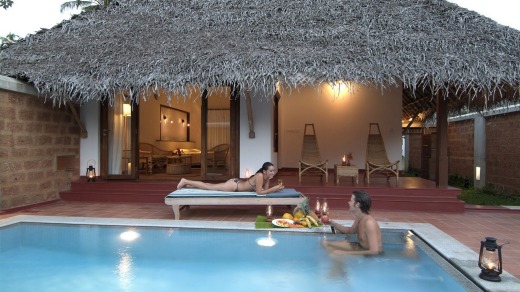
This early experiment in sustainable tourism proved a hit, transforming the simple beach resort into a desirable destination as well as a profitable business. The Bangaram resort is currently closed pending renegotiation of the lease.
With the Bangaram template in mind, Dominic sought other opportunities, establishing Spice Village at Thekkady, on the doorstep of the Periyar Tiger Reserve in the Western Ghat mountains, in 1992.
Based on a "tribal village" concept, the hotel was constructed using natural materials, indigenous architecture and community ideals, offering guests an experiential insight into the local culture through cooking classes, local transportation, garden visits and making stationary from waste products.
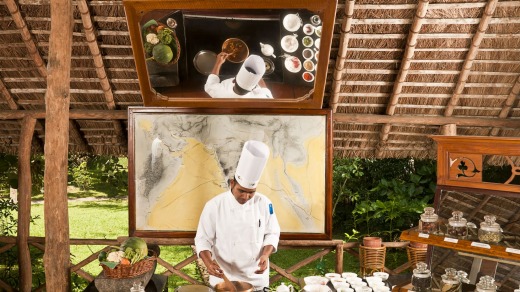
Kerala – a state that lives up to its tourism slogan of "God's Own Country" – is best known for its backwaters, with visitors relishing the opportunity to soak up the languid, tropical ambience on a houseboat cruise or at a canal-side resort.
CGH Earth was at the forefront of this iconic Keralan experience, transforming an abandoned coconut plantation into a heritage resort and refining the local mode of transport, "kettuvallom" rice barges, to create the first luxury houseboats plying the backwaters.
"We were the first to promote the backwater experience with Coconut Lagoon, our property on the shores of the Vembanad Lagoon at Kumarakom. For this resort, we took the concepts established at Spice Village one step further, transporting heritage structures to the site and creating an actual feudal village," Dominic explains.
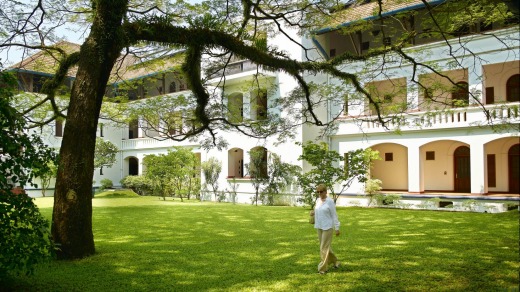
The core of this experience is for travellers to immerse themselves in local life, allowing nature and the environment to take centre stage. Several of the properties have their own organic farms, as well as waste management centres and independent power sources; while local health and wellness practices, such as yoga and Ayurvedic treatments, are incorporated into guest programs to make the experience holistic, beneficial for mind, body and soul.
Dominic's challenge now is how to take these very Keralan concepts beyond the state, to regions such as Rajasthan, the Himalayas and Tibet. He admits that his concept of homespun pleasures is worlds apart from the palatial luxury offered by companies such as Taj and Oberoi – but believes there is a market waiting to be tapped.
"I want to take what's "normal" in those parts of India and completely flip it round. Expect the unexpected, and enjoy the ride!"
Here's what to expect at some of the CGH Earth properties:
BRUNTON BOATYARD, COCHIN
Cochin is a working harbour, and this colonial-style building built on the site of a 19th-century shipyard reflects the maritime heritage of the city. With absolute water frontage, and views of the city's iconic Chinese fishing nets, Brunton Boatyard is CGH Earth's flagship city property. Furnished with gorgeous antiques, including four-poster beds requiring a step ladder to mount, guest rooms are airy and charming, with treats such as fresh flowers every day adding a touch of intimacy.
Green initiatives: Bottled water from the hotel's own rainwater well. Use of plastics discouraged. Locally sourced, organic produce used in the restaurant. Solar panels for hot water. Own sewage treatment plant.
Signature experience: Sunset cruise on the harbour, with the perfect Kodak moment of silhouetted fishing nets against a firebrand sky.
SPICE VILLAGE, THEKKADY
Most guests come to Spice Village to visit Periyar Tiger Reserve, but nature is also king within the resort grounds, with a wealth of visiting birdlife, cheeky macaques and a veritable botanic garden featuring every type of spice tree. The resident naturalist runs property tours, proudly (quite rightly!) showing off its impressive solar plant, waste management and lush vegetable garden tended by local villagers. Spice is a Green Leaf certified organic property, and has won numerous environmental awards including the 2009 PATA award for environment, the first Indian hotel to receive this honour.
Green initiatives: Organic vegetable garden, paper-making centre, vermicomposting, effluent treatment plant, use of natural pesticides. A huge solar panel plant meets almost all of the resort's power requirements. '50 Mile Diet', sourcing all produce within an 80-kilometre radius of the resort. No airconditioning, instead utilising natural products and flow-through spaces to keep the rooms cool.
Signature experience: Cooking demonstration using spices found in the resort's gardens. Naturalist walks through the property and Tiger Reserve.
COCONUT LAGOON, KUMARAKOM
Located on the edge of the expansive Vembanad Lake linking the Kerala backwaters, this isolated, tranquil resort is accessible only by boat. A series of canals criss-cross the property, while nearly half a hectare of land is dedicated to rice cultivation. Several pool villas, the Ayurvedic spa and the yoga sala all boast views of this beautiful, natural expanse, which is a haven for birdlife. The collection of 150-year-old heritage mansions and bungalows – each unique in its style and detail – were transported from a nearby village and then reassembled beam by beam by descendants of the master craftsmen who originally built them.
Green initiatives: Recycled waste water used for irrigation; biogas plant; rainwater harvesting; preservation of an endangered species of small cow, the vechoor. A tranquil butterfly garden to encourage insect life.
Signature experience: Morning birdwatching with the resident naturalist, spotting more than 90 species of birds including vivid kingfishers, darters and herons.
MARARI BEACH, MARARIKULAM
Australian guests will be thrilled to discover that Marari is a beautiful, clean, white-sand beach rivalling any Aussie or Asian shoreline. Built to resemble a local fishing village, and set back from the beach behind a coconut plantation, this unassuming, low-key resort is all about relaxation. There's very little to do, nothing much to see – it's the perfect chill-out. Have an Ayurvedic massage, a cup of chai served by the village "chaiwallah", wander through the butterfly garden or admire the organic vegetable garden. Guest villas resemble local thatched cottages, with traditional bathrooms in an open courtyard (complete with bugs and the occasional harmless snake!).
Green initiatives: Rainwater harvesting, vermiculture and biogas waste management, organic garden, butterfly garden to encourage bird and insect life.
Signature experience: The Farm Kitchen, with interactive cooking classes held in the heart of the organic garden, where ingredients are freshly plucked.
cghearth.com, mantrawild.com.au
Air India flies from Sydney via Melbourne daily to Delhi, with domestic transfers to Cochin.
Mantra Wild Adventures offers a 15-night Kerala package featuring accommodation at several CGH Earth properties, including Spice Village, Coconut Lagoon, Marari Beach Resort and Brunton Boatyard, from $5499 per person (October-April, excluding Christmas/New Year), or $3999 May-September. Includes twin share accommodation, daily breakfast, some activities, and safaris and driver.